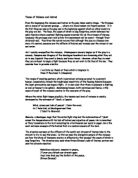Hatred and vengeance in "The Merchant of Venice".
The Cyclical Nature of Hatred and Vengeance
By Darina Gaievska
Love and hatred, happiness and misery, excitement and lethargy – all of these emotions are inherited to the human nature. Hatred fits in among one of the strongest human feelings; it is a seed that engenders vengeance. In the Shakespeare’s play, The Merchant of Venice, these two inextricably bound terms are portrayed unequivocally. There are three main reasons why hatred was such a focal ingredient to the play: the Anti-Semitism, the unacceptability of usury and the personal altercations between the focal characters
First and foremost, the tensions between the play’s protagonist and antagonist take place primarily due to the cultural notion of Anti-Semitism. In spite of Venice being the multicultural and hence multi-religious trade city, the discrimination of the Jewish people was yet apprehensible. Throughout The Merchant of Venice Antonio keeps referring to Shylock as “The Jew”, a term that was so derogatory at the time. Although there isn’t much use of direct anti-Semitic slurs, the enmity towards the subculture still lurked in the passages of the play. When Shylock slyly alluded to Jacob from Genesis, justifying his practice of usury, Antonio responded dismissively, saying that “the devil can cite Scripture for his purpose”. By calling Shylock “the devil” due to Shylock’s faith. In the merchant’s eyes, Jews were traitors, who deceived the Christ. Although Shylock shows his awareness of the Christian religion, Antonio does not respect him more; arguing that in spite of the knowledge he possesses “The Jew” is nevertheless a disbeliever.








